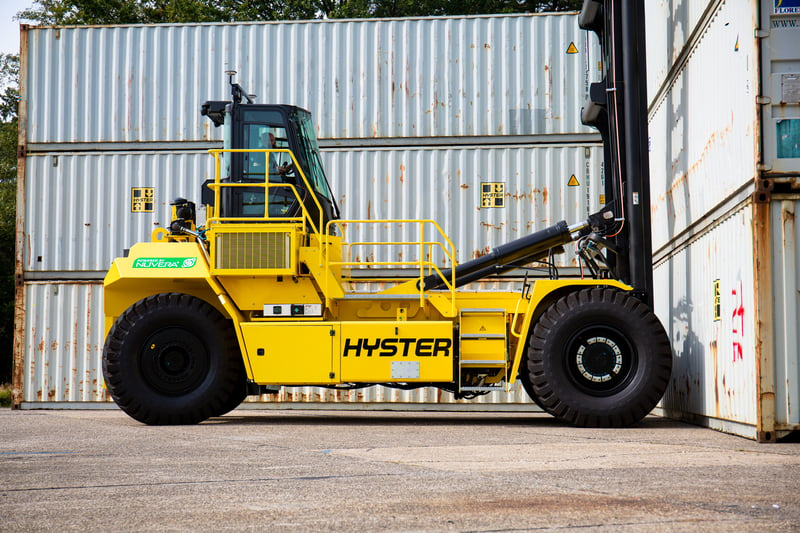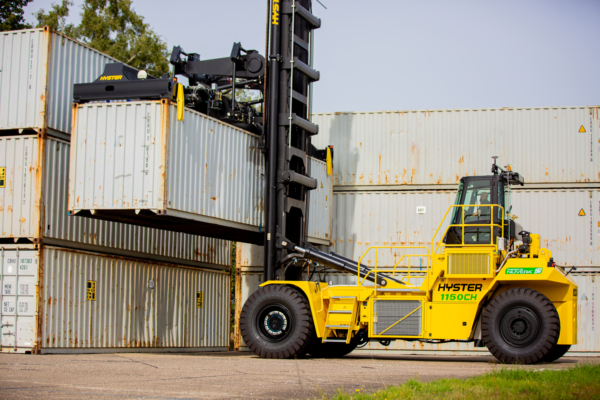
Hyster begins first-ever real-world pilot of hydrogen fuel cell-powered container handler at Los Angeles port
Hyster Company announces testing of a top-pick container handler powered by hydrogen fuel cells (HFC) at Fenix Marine Services in the Port of Los Angeles. Building on the industry standard Hyster® H1050-1150XD-CH top-pick container handler design, the truck is powered by two 45kw hydrogen fuel cells from Nuvera, a wholly owned subsidiary of Hyster parent company Hyster-Yale Group. A California Climate Investments grant awarded by the California Air Resources Board in 2018 helped support the development of the HFC-powered container handler.
The HFC-powered top pick is designed to provide the zero-emissions benefits of a battery-electric option, with enough capacity to keep operators moving and avoid the need to stop in the middle of a shift to refuel or recharge. Refueling the top pick with hydrogen fuel is expected to take approximately 15 minutes, with the intention to provide eight to 10 hours of continuous run time, all while producing no harmful emissions – only water and heat. The hydrogen fuel cell works in tandem with an onboard lithium-ion battery to either power the equipment directly or charge the onboard battery. The top pick is also equipped with a patented Hyster® energy recovery system for electric container handlers that recovers and stores energy from lowering loads and braking.
 The Fenix Marine Services (FMS) container terminal, acquired in 2021 by the CMA CGM Group, a global player in sea, land, air, and logistics solutions, uses compressed hydrogen delivered on-site to fuel the top pick.
The Fenix Marine Services (FMS) container terminal, acquired in 2021 by the CMA CGM Group, a global player in sea, land, air, and logistics solutions, uses compressed hydrogen delivered on-site to fuel the top pick.
“We are excited to participate in this pilot and implement another sustainable solution designed to help meet Clean Air Action Plan 2030 objectives. Exploring the use of hydrogen as a zero-emission fuel source is important for the entire transportation industry and is a perfect complement to the other alternative energy research and development projects our parent company, CMA CGM Group, is spearheading to protect the planet and reach net-zero carbon by 2050,” says FMS CEO Steve Trombley.
To electrify higher-capacity equipment for port terminals, Hyster draws on extensive experience in electric truck design with the company’s line of smaller, lighter-capacity powered industrial trucks used in both indoor and outdoor settings. The company has recently launched lithium-ion powered forklifts with load capacities up to 36,000-pounds, and previously announced a pilot of a fuel-cell powered ReachStacker at the Port of Valencia, a fuel cell-powered empty container handler at a terminal in Hamburg, Germany, and a joint partnership to develop electric and hydrogen-powered terminal tractors.
“Our mission is to provide the innovative technologies our customers need to help meet their goals for emissions reduction and performance. For some operations, lithium-ion power might be the answer, but for others, hydrogen is the right choice,” says Jan Willem van den Brand, director, of global market development, big trucks, Hyster. “The answer depends on so many factors like duty cycle, utility grid capacity, and fuel availability. Our customers deserve choices that allow them to build the right solution based on their needs – not shoehorning a single technology into their operation.”
This project is part of California Climate Investments, a statewide initiative that puts billions of cap-and-trade dollars to work reducing greenhouse gas emissions, strengthening the economy, improving public health and the environment, and providing meaningful benefits to the most disadvantaged communities, low-income communities, and low-income households.









